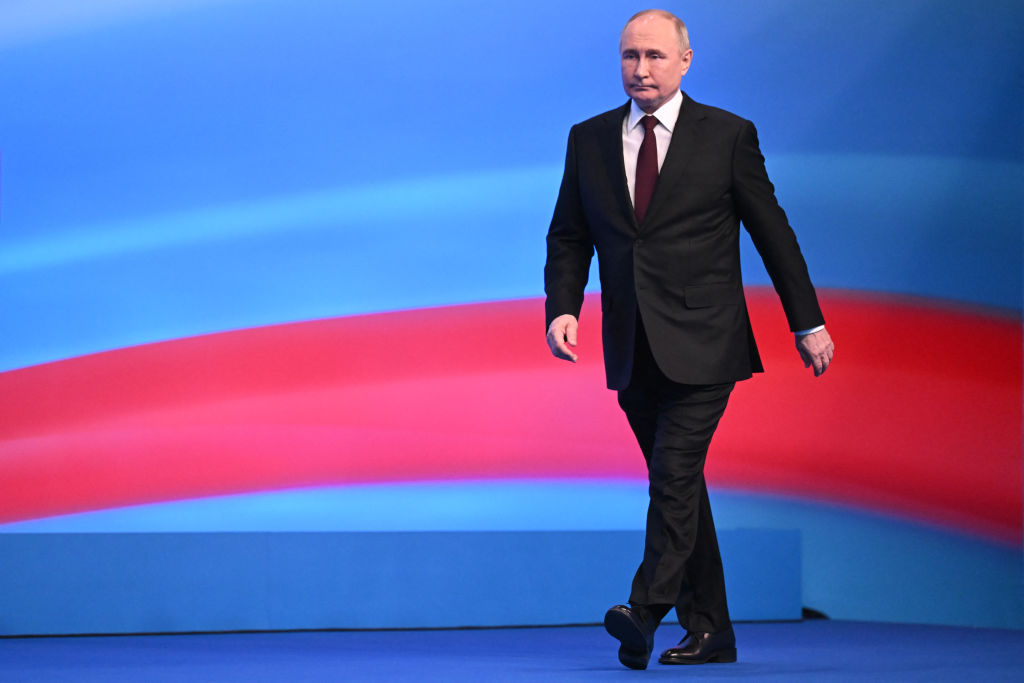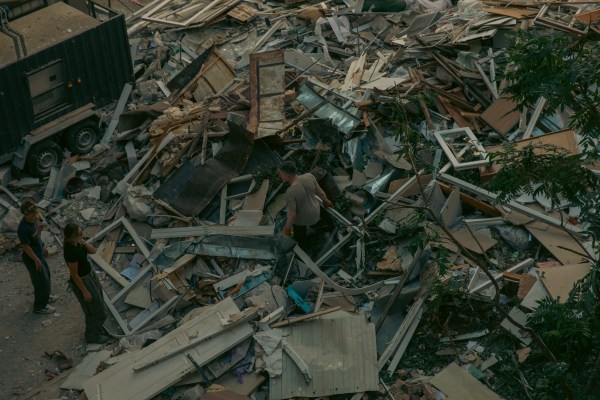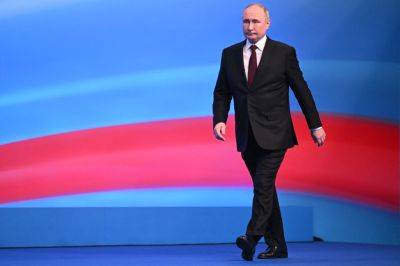Happy Monday! It is that time of year again: The annual Morning Dispatch March Madness bracket pool is back and better than ever!
To enter, click here (you will need a free ESPN account) and select “Join Group.” The password is “TMD2K24!” and your bracket must be submitted by Thursday morning before the first game’s tip-off. Anyone is invited to participate, but if you want to be eligible for prizes—including a Lifetime Membership to The Dispatch, a TMD mug, or a gift card to The Dispatch’s merch store—you must a) be an active paying Dispatch member on or before March 21, 2024, and b) fill out this form so we can connect you with your ESPN entry.
We’ll keep you updated on the leaderboard over the next few weeks. Let’s get even more entries than we did last year!
Quick Hits: Today’s Top Stories
- Russian President Vladimir Putin claimed victory in his country’s pseudo-election on Sunday, paving the way to a fifth term. The final day of the three-day process was marked by protests inspired by late dissident Alexei Navalny, who died in a Siberian prison in February. Lines formed suddenly outside polling stations at noon on Sunday as Russians gathered to cast protest votes, just as Navalny had advocated before he died.
- Meanwhile, Ukraine launched drone strikes deep inside Russian territory on Sunday, which the governor of Belgorod Oblast claimed killed a teenage girl and injured her father. The Ukrainian strikes followed Russian missile attacks on Friday, which Ukrainian officials said killed at least 20 people in the port city of Odesa; the first missile, which hit several homes, was quickly followed by another, presumably targeting rescue workers.
- The first sea-borne aid delivery to Gaza, provided by nonprofit World Central Kitchen via a new maritime humanitarian corridor, arrived on Friday. A second aid ship, sailing from Cyprus, is preparing to sail across the Mediterranean to the enclave. The Israel Defense Forces confirmed that “130 pallets of humanitarian aid and 115 pallets of food and water” had been transferred to trucks operated by World Central Kitchen to distribute the goods in northern Gaza.
- Niger’s military junta said Saturday that the U.S. military presence in the country was no longer justified, revoking the military accord that allowed for American boots on the ground. The U.S. and Niger have long been partners in counterterrorism efforts in the Sahel region, and Niger hosts somewhere between 600 and 1,000 U.S. troops and a drone base—though the U.S. suspended military aid to the country following a coup in July. The announcement followed a visit by a U.S. delegation that included Molly Phee, the U.S. assistant secretary of state for African affairs, and Gen. Michael E. Langley, who leads U.S. military operations in Africa.
- The National Association of Realtors (NAR) announced on Friday that it had settled with groups of homesellers accusing NAR—and brokerages requiring their Realtors be members of NAR—of violating antitrust laws by setting inflated commissions for real estate agents and artificially increasing home prices. The NAR agreed to pay $418 million in damages to the plaintiffs, eliminate the industry-standard 6 percent commission, and curtail rules that required the seller’s agent to make an offer of payment to the buyer’s agent. Without a standard commission, Realtors will likely have to lower their commission to compete, which could lower home prices overall since sellers often priced-in the cost of those fees. The NAR denied any wrongdoing as part of the settlement.
- At a campaign rally in Ohio on Saturday, former President Donald Trump suggested illegal immigrants with criminal records are “not people” during his speech. “I don’t know if you call them people,” he said. “In some cases they’re not people, in my opinion. But I’m not allowed to say that because the radical left says that’s a terrible thing to say.” The former president also raised his hand in a salute during an alternative version of the national anthem honoring January 6 “hostages,” whom he praised as “unbelievable patriots.”
- Former Vice President Mike Pence said Friday that he could not “in good conscience” endorse his former running mate’s third bid for the presidency. Pence argued Trump is “pursuing and articulating an agenda that is at odds with the conservative agenda that we governed on during our four years.” He also said he would not vote for President Joe Biden or run himself as a third-party candidate.
- Judge Scott McAfee of Georgia’s Fulton Superior Court—overseeing Fulton County District Attorney Fani Willis’ racketeering case against Trump and more than a dozen other defendants—ruled Friday that Willis could remain as a prosecutor provided Nathan Wade, a special prosecutor on the case and Willis’ former romantic partner, resigned. Wade swiftly resigned the same day, the culmination of a weeks-long effort by defendants to have Willis removed from the case over an alleged conflict of interest. McAfee called Willis’ decision to date Wade a “tremendous lapse in judgment.” Meanwhile, a New York judge ruled Friday that Trump’s trial in Manhattan District Attorney Alvin Bragg’s case regarding hush-money payments to an adult film star would be delayed until at least mid-April. The additional time will allow the defense to review evidence recently turned over.
A So-Called ‘Landslide’ in Russia

When it comes to election reporting, we at TMD are usually up quite late, waiting to bring you the most accurate numbers possible in contests potentially decided by razor-thin margins.
We could have written this item on Russia’s “elections” weeks ago.
Russian President Vladimir Putin’s projected reelection victory was never in question, and the contest on Sunday was more performance art than democracy. A protest movement—Noon Against Putin—saw long lines of voters at polling stations voicing their opposition to the Russian leader’s perpetual grip on power, though it provided little more than a footnote to Putin securing a fifth term.
Initial official results from the three-day process showed Putin securing almost 90 percent of the vote, according to Russia’s Central Election Commission, with more than 74 percent turnout. Putin’s victory assures he’ll lead the nation through at least 2030—making the 71-year-old the longest-serving leader of Russia since Soviet dictator Josef Stalin.
Western observers dismissed this weekend’s results, as Putin has a demonstrated history of cheating. “He’s already rigging, of course, the election by utilizing the state monopoly of the media to promote his candidacy, by basically pushing state-owned enterprises and government workers to come out and vote for him, where they would actually be bused into these polling places,” Dmitri Alperovitch, founder of the Silverado Policy Accelerator think tank, told TMD.
The sham election was also organized to minimize any chance of competition. Putin ran against three candidates who posed no serious threat to his victory, while other candidates—including antiwar candidate Boris Nadezhdin—were barred from running by Russian officials. “Usually in Russian elections, there’s a few interesting tidbits to glean from the results where there’ll be candidates that look like opposition candidates that are, in some ways, fig leaves to the opposition to make the elections look real,” said Max Bergmann, director of the Europe, Russia, and Eurasia Program and the Stuart Center in Euro-Atlantic and Northern European Studies at the Center for Strategic and International Studies. “When Boris Nadezhdin, who was that sort of nominal opposition candidate, started to really gain ground, then the Kremlin nixed his candidacy. So it’s now clearly just a coronation election.” Nadezhdin has continued to say that Putin is leading the country in the wrong direction.
In his victory speech on Sunday, Putin railed against Western criticism. “What did you want, for them to applaud us?” he asked a crowd at his campaign headquarters. “They’re fighting with us in an armed conflict [...] their goal is to contain our development. Of course they’re ready to say anything,”
While Russia’s electoral mirage has not fooled outside observers—a White House National Security Council spokesperson called the contest “obviously not free nor fair”—Kateryna Stepanenko, a Russia analyst with the Institute for the Study of War, told TMD that what’s more remarkable is Putin’s insistence on the performance of an election. “The question of legitimacy is something that Putin has constantly shown that he really cares about, presenting his elections as legitimate to this world and kind of playing this theatrical move,” she said. “It is clear that they’re not legitimate.”
“From the psychological perspective, Putin seems to always need to stage these elections in such a way where it seems like through propaganda he has mass public support,” she added. “And that is because he’s trying to show that he can’t simply rig the election outrageously without calling into the larger question about his own legitimacy.” In effect, Stepanenko argues, his goal is “to have Russians think that other Russians support Putin.”
The election’s supposedly record-setting turnout was also likely inflated. “The announced turnout will not be low, that is almost guaranteed,” Alperovitch told TMD. “Because even if it’s low in reality, they’re going to make it look like it’s not. And again, they’re going all out with election promises of everything under the sun for the pensioners, the government workers, all sorts of benefits that have been thrown at the population to try to get them to come out voluntarily.” Evidence of voter coercion has also emerged, particularly in Russian-controlled regions of Ukraine that were allowed to participate in the farce.
Much of Putin’s campaign focused on his war in Ukraine—which he has increasingly defined as a civilizational war not only against Ukraine, but against the West. “Putin’s messaging is interesting because it could indicate how he’s trying to present his presidency in relation to securing public support for the war,” Stepanenko said. “It would be interesting if Putin’s rhetoric materializes into something where he can frame his reelection as [evidence of] overwhelming support for a prolonged war in Ukraine.”
But Bergmann believes Putin’s view of the war in Ukraine doesn’t necessarily match the view of his people. “I don’t think the Russian public really buys and has bought that this is sort of an existential conflict for them,” he told TMD. “The fact that they had to, or felt the need to, eliminate even the token opposition candidate in Nadezhdin shows there’s still a degree of paranoia about where they stand with the public, and they were nervous that something would catch fire.”
Softening support for a long-term war in Ukraine wasn’t the only concern for the Kremlin. Putin publicly addressed the death of opposition leader Alexei Navalny—who died suddenly in an Siberian prison colony last month—for the first time on Sunday, calling it “an unfortunate incident.” Even a month after his death, the fear of Navalny and his movement have hung over Putin. “A fully confident Kremlin doesn’t necessarily feel the need to kill Navalny,” said Bergmann. “[He’d] already been neutralized, but ahead of the election, I think there was a degree of nervousness about him.”
That nervousness was warranted—though Putin’s victory was never in question, Navalny was able to inspire an election day protest movement. Before his mysterious death, Navalny urged Russians to protest Putin’s power grab by showing up to polling stations en masse at noon on Sunday to vote for any candidate other than Putin, physically demonstrating the nation’s opposition to the fixed elections. “If lots and lots of people show up at noon, versus other times, people will know and visibly see that they’re coming out against Putin,” said Alperovitch. “That can create an atmosphere where people will appreciate that the election is truly rigged, and the hope is that it would cause some protest movements as a result.” Thousands of Russians participated in the showing across the continent—a tiny fraction compared to the 15,759,224 who allegedly voted for Putin.
Putin’s continued rule of Russia, on its surface, means little will change for a Western world forced to deal with him. “The direction of the relationship with Russia is going to very likely go in only one direction, and that’s in a worsening direction,” Alperovitch told TMD. “So I don’t think that from a foreign policy perspective, you’re actually going to see much change at all on the Russian side.” On the domestic policy front, however, Alperovitch indicated several likely changes. “By law, the entire Cabinet gets dismissed automatically once a new president is elected,” he said. “So both the prime minister and every minister resign, and then some of them may get reappointed again, but you very likely will also see this being used as an opportunity to bring some fresh blood potentially to some of these key positions.” Alperovitch pointed to embattled Russian Defense Minister Sergei Shoigu as a candidate for replacement.
Bergmann argues that Putin’s fifth term—and his continued bellicose rhetoric against the West and NATO—marks the need for a shift in policy toward Russia. “Every new American president since the Cold War has tried to engage Russia,” he told TMD. “What’s pretty clear is that, if this election is the coronation we think it is, then this is the Russia we have to deal with. And it’s one that affirms that Russia is an adversary of the United States, and has to be treated as such.”
Worth Your Time
- Since the events of January 6, 2021, many politicians and media personalities have tried to rewrite history—sometimes successfully—to downplay the severity of the violence or obscure the reality of former President Donald Trump’s non-response to the violence as it was happening. As longtime Dispatch contributor and former staffer to the select House committee investigating January 6 Thomas Joscelyn wrote in Just Security, this revisionist history isn’t accurate. “Former President Donald Trump and his loyalists have long claimed that he ‘ordered’ the National Guard to be ready for deployment on Jan. 6, 2021,” Joscelyn wrote. “The implication was clear: President Trump did not deserve blame for the violence that unfolded at the U.S. Capitol because he wanted the National Guard to keep the peace. There’s just one problem: The claim is not true. The House Select Committee to Investigate the January 6th Attack on the U.S. Capitol thoroughly investigated this issue—questioning multiple witnesses about it and reviewing countless documents. The committee could not find any evidence to support [former White House Chief of Staff Mark] Meadows’ claim. Indeed, Trump’s Acting Secretary of Defense at the time, Chris Miller, directly refuted it in his testimony under oath—explaining that the president did not issue any such order. In its final report, the committee summarized the testimony of witnesses who claimed that Trump had floated the idea of deploying 10,000 National Guardsmen—mainly to protect him and his supporters [emphasis Joscelyn’s] as they marched together to the U.S. Capitol. And, as the committee explained in the executive summary to its final report, the investigation uncovered ‘no evidence’ that ‘President Trump gave an order to have 10,000 troops ready for January 6th.’ More than one year after the committee disbanded, there is still no reason to think Trump ordered the National Guard to be ready on [January] 6, 2021.”
Presented Without Comment
New York Times: If Nvidia Keeps Rising Like This, It Will Be Bigger Than the Global Economy
Also Presented Without Comment
Axios: Trump Says Israel Should Quickly End the Gaza War, ‘We Need Peace’
“You have to finish it up and do it quickly and get back to the world of peace. We need peace in the world … we need peace in the Middle East,” Trump said when asked by MediaBuzz host Howard Kurtz what he would tell Netanyahu about the war in Gaza.
Also Trump: “The Democrats are very bad for Israel. Israel sticks with them. I guess Israel is loyal, maybe to a fault, because they stick with these guys. Biden is so bad for Israel.”
Also Also Presented Without Comment
CBS News: Former Vice President Mike Pence Calls Trump’s Jan. 6 Hostage Rhetoric ‘Unacceptable’
Toeing the Company Line
- In the newsletters: The Dispatch Politics crew covered the mass layoffs at the RNC, Nick explored (🔒) what could happen if Democrats actively encouraged likely Trump voters to support the anti-vax RFK Jr., and Chris discussed (🔒) the pitfalls of lumping all non-white voters together in political analysis.
- On the podcasts: Jonah overcame illness to ruminate on a potential TikTok ban and Chuck Schumer’s call for new elections in Israel, Victoria discussed the situation at the border with Bishop Mark Seitz on the Dispatch Podcast, and former Trump administration official Dan Negrea and national security strategist Matt Kroenig joined Jamie on the Dispatch Podcast to discuss their book We Win, They Lose.
- On the site over the weekend: Sean Keeley reviewed Dune: Part Two, Luis responded to the arguments in Coleman Hughes’ book The End of Race Politics, and Hannah Anderson encouraged the edifying practice of formally joining a group—whether it’s a church choir or a bird watching group.
- On the site today: Charlotte details the effort to get humanitarian aid to Gaza.
Let Us Know
Should the U.S. recognize international leaders who have risen to power through rigged contests?








Please note that we at The Dispatch hold ourselves, our work, and our commenters to a higher standard than other places on the internet. We welcome comments that foster genuine debate or discussion—including comments critical of us or our work—but responses that include ad hominem attacks on fellow Dispatch members or are intended to stoke fear and anger may be moderated.
With your membership, you only have the ability to comment on The Morning Dispatch articles. Consider upgrading to join the conversation everywhere.